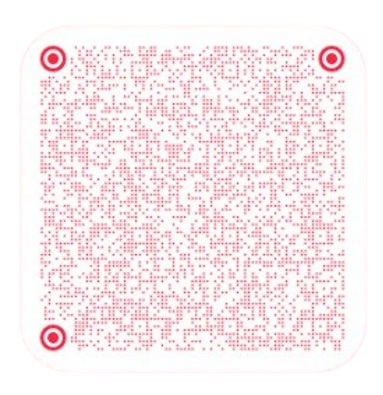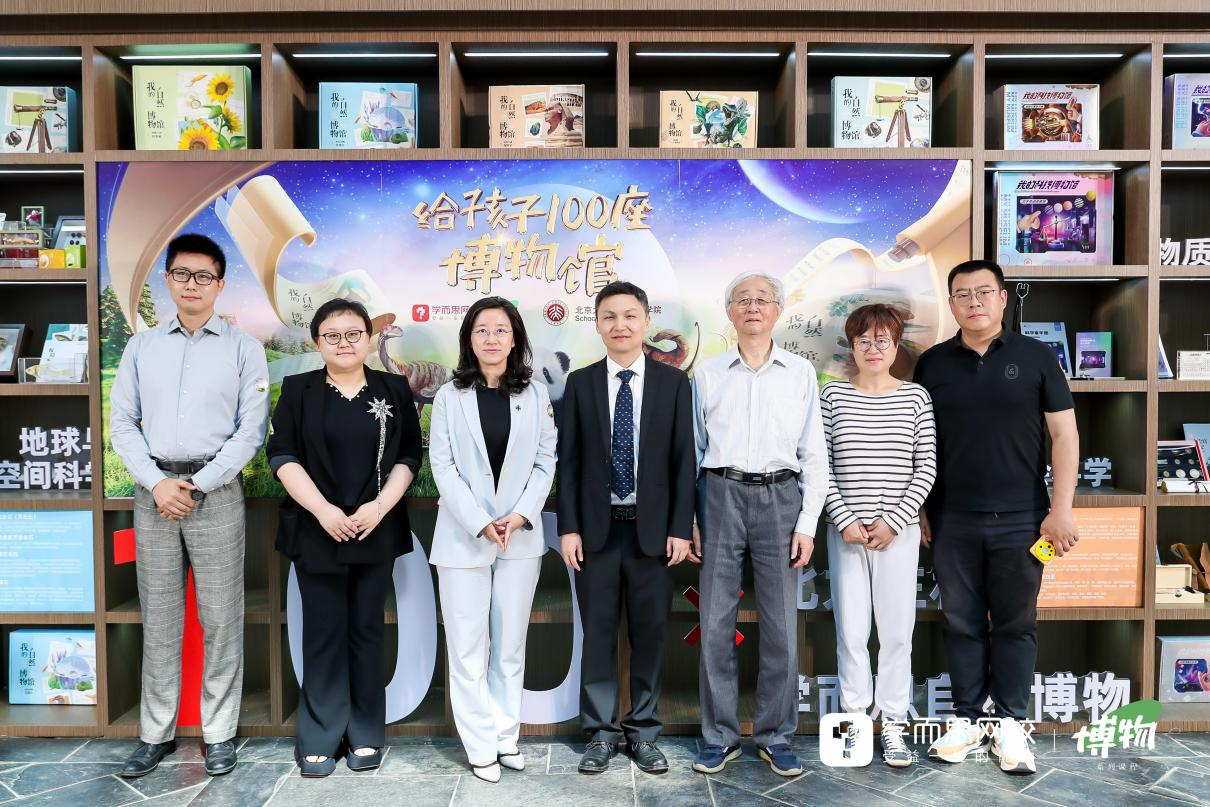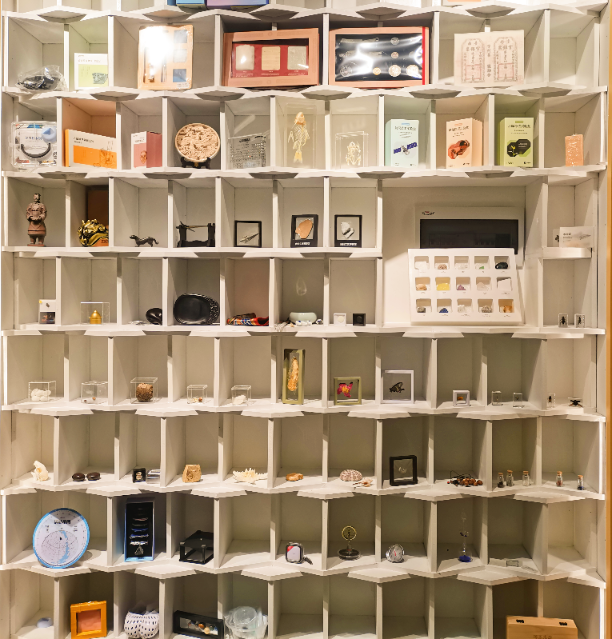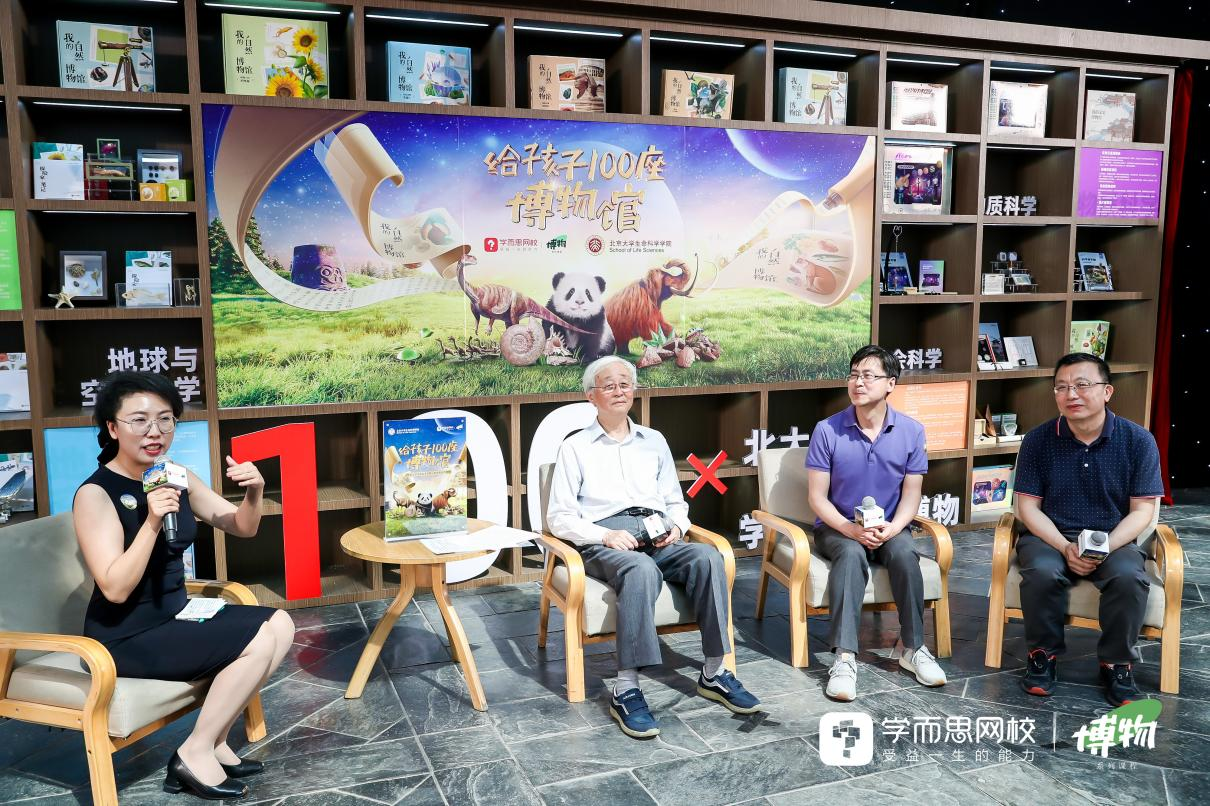




On May 18th, International Museum Day, Xueersi Museum partnered with the School of Life Sciences (SBS) at Peking University to launch the "100 Museums for Children" initiative. This philanthropic project will donate curated collections to 100 primary schools nationwide to establish on-campus micro-museums.The launch ceremony was attended by distinguished guests including: Shi Changyi, Party Committee Secretary of SBS, Peking University, Xu Chongren, Director of Peking University's Biological Specimen Museum, Professor Lu Zhi from SBS, Peking University, Liu Chao, Director of Alumni and Social Services Center at SBS, Peking University, Laura , Executive President of TAL Education Group, Hao Yuefei, General Manager of Xueersi Online School, Pan Yebo, Head of Xueersi Innovation Project Department. The attendees jointly inaugurated this initiative at the unveiling ceremony.
In the evening, the two parties also held an online "Museum Cloud Science Exploration" activity, inviting Professor Xu Chongren, Director of the Biological Specimen Museum of Peking University, to share the long history of the museum and the stories behind the treasures, as well as unforgettable scientific research experiences with students from all over the country, allowing them to experience the strong scientific research atmosphere of Peking University.
"It's not about taking children to museums, but bringing museums to children."
The SBS of Peking University, founded in 1925, is one of the earliest biological departments in Chinese institutions of higher education. The centenary of the founding of the SBS at Peking University is approaching in 2025. Xueersi, as an alumni enterprise of Peking University's SBS, donated a wall of fossilized "Chenlian Stone" from the Ordovician period on the day of the event to celebrate the centenary of the SBS at Peking University and extend congratulations to the majestic history of the SBS at Peking University, leaving its own historical mark in every era.
At the same time, on the special day of May 18th, International Museum Day, Xueersi Natural History Department, in collaboration with the SBS of Peking University, initiated the "100 Museums for Children" themed public welfare project. The project will support 100 primary schools, including remote mountainous and western regions, by donating 16 sets of 100 natural, scientific, and historical theme collections and supporting courses to each school in the form of mini-museums, allowing children to have a close encounter with fossils from millions of years ago, rich and precious natural specimens, dazzling scientific installations, and historical artifacts that bridge the past and present.

[Image: A group photo at the launching ceremony. From right to left: Liu Chao, Director of the Alumni and Social Service Center of the SBS, Peking University; Professor Lu Zhi, SBS, Peking University; Xu Chongren, Director of the Biological Specimen Museum, Peking University; Shi Changyi, Secretary of the Party Committee of the SBS, Peking University; Laura , CEO of TAL Education Group; Hao Yuefei, General Manager of Xueersi Online School; and Pan Yabo, head of the innovation project department, Xueersi.
Shi Changyi, Secretary of the Party Committee of the SBS, Peking University, delivered the opening speech, saying, "This time, the public welfare initiative jointly launched by the college and Xueersi Museum aims to focus on supporting schools in rural and remote areas, especially those on the front line of ecological protection. Through the introduction of a series of teaching aids, courses, and exhibits, it will benefit countless local students from the snowy plateau to the tropical rainforest."
Laura, CEO of TAL Education Group, stated in his speech, "Xueersi Natural History Department has been prosperous for the past two years, helping tens of thousands of students to access and learn about rich museum knowledge on the Xueersi platform. I believe that the Museum themed public welfare project jointly initiated by Xueersi and the SBS of Peking University can bring some help and inspiration to front-line schools and teachers, stimulating and satisfying children's curiosity about nature and science."
Hao Yuefei, General Manager of Xueersi Online School, remarked, "Xueersi hopes to allow more children to enjoy the same educational resources through the '100 Museums for Children' donation activity. Regardless of their location, children should be able to explore the vastness of the universe, the richness of history, and the wonders of nature."
It is reported that the first mini-museum donated and established by the project has officially landed at Baofu Primary School in Anji County, Zhejiang Province. Recruitment and selection work for more schools are underway. Schools interested in participating can apply by filling out a questionnaire.

[Image: On-site picture of the mini-museum at Baofu Primary School in Anji, Zhejiang]
What is good museum education? Head of Xueersi Natural History Department in dialogue with Peking University professors
Museums are a bridge connecting the past, present, and future, and each cultural relic and specimen records the history of humans and all living things. With the development of scientific and cultural education, more and more young people are entering museums to comprehend knowledge in various fields. The social education function of museums is increasingly prominent as they serve as carriers.
Midway through the ceremony, Dr. Zhang Dan, in charge of Xueersi Natural History Department, invited Professor Xu Chongren, Director of the Biological Specimen Museum at Peking University, Professor He Xinqiang, Director of the Public Experimental Teaching Center of the SBS, Peking University, and Executive Deputy Director of the Biological Specimen Museum, and Associate Professor Wang Rongjiang, all teachers from the SBS at Peking University, to participate in a roundtable forum for an in-depth discussion on the "importance of museum education for young people."
Professor Xu Chongren said that many disciplines in the world have evolved after the establishment of museums, so the role of museums cannot be overstated. However, visiting museums superficially often only skims the surface. Therefore, there needs to be specific educators who can explain it clearly, helping visitors see the scientific principles and problems behind the exhibits.
Professor He Xinqiang stated that museums and specimen museums are comprehensive educational platforms. In terms of time scale, they connect the past, present, and future, and each collection has a history. In spatial scale, specimen museums gather landscapes from different regions in a very small space, which is very rare. Directly facing fossils, flora and fauna specimens, etc., provides a visual effect that classroom textbook teaching cannot achieve.
Associate Professor Wang Rongjiang has extensive experience in field research. He said that pictures are two-dimensional, museum animal and plant specimens are three-dimensional, and real, living animals seen in the field are of a four-dimensional experience. Not everyone can have a four-dimensional experience, so museums are very meaningful and can provide a deeper understanding of the natural world.
Dr. Zhang Dan also shared her feelings, saying that truly nurturing children involves immersing them in museums. The theme of this year's "International Museum Day" is "Museums dedicated to education and research." Dr. Zhang Dan hopes to call on more families to pay more attention to museum education, and make use of and inherit museum knowledge and culture. Confucius said, "knowing the names of grass, trees, birds, and beasts." For museum education, natural history museums are also an indispensable part.

[Image: Site of the roundtable forum]
The significance of museums has been a public consensus, but its physical and regional characteristics can limit audience participation. Therefore, the teachers hope that by donating "mini-museums" to schools in remote areas, this will break some of these limitations. Although the collections and facilities of the "mini-museums" cannot be compared with those of large museums, they can integrate into children's daily learning in an accessible way and also serve as a good museum education.
Take a "Cloud Science Exploration" with Peking University professors to convey the beauty of nature and the spirit of scientific research
On the night of the 18th, Professor Xu Chongren, Director of the Biological Specimen Museum at Peking University, was invited to conduct an "online Museum Cloud Science Exploration" for middle and primary school students across the country together with Dr. Zhang Dan, head of Xueersi Museum.
The two expert teachers took the students into Peking University Biological Specimen Museum to learn about the stories behind the precious collections and the hundred-year history of the museum.
Professor Xu Chongren introduced that the history of the Biological Specimen Museum at Peking University can be traced back to the 33rd year of Guangxu during the Qing Dynasty (1907), when Peking University established the "museum" discipline. Today, the "treasure of the museum" of biological specimens is a wild duck specimen collected in 1908, now the earliest known animal taxidermy specimen in China.
The two teachers took the students on a "cloud tour" of the splendid and colorful biological specimen collections. These include precious extinct amphibians such as Dian salamanders, a variety of butterfly and shell specimens, as well as sensitively placed mammalian specimens such as wild yaks and donkeys that almost appear to leap out to the audience... Each specimen has different knowledge and stories behind it.
Dr. Zhang Dan, of Xueersi Natural History Department, has rich experience in field research and has published scientific research results in several international core journals. In recent years, she has lectured on multiple courses on museum literacy for middle and secondary school students at Xueersi and excels at entertaining and humorous ways to help children understand the wonders of nature. During the "Museum Cloud Science Exploration" event, Dr. Zhang Dan explained the production process of taxidermy specimens, shared her learning experiences during her studies at Peking University's School of Biological Sciences, and also displayed insect specimens from the Xueersi Museum box.
Subsequently, the participants were taken into the mysterious "museum within the museum", which was praised by Princess Maha Chakri Sirindhorn of Thailand during her visit. Professor Xu Chongren introduced that this special collection area contains very precious or special specimens and items. For example, there are nearly 200-year-old plant specimens, as well as ancient Cycas taitungensis specimens that lived during the same era as the dinosaurs, and more.
The students interacted actively with the two teachers online, showing their love and knowledge of nature and flora and fauna, and learned rich knowledge in the process.
This cloud science exploration activity was a new attempt for Peking University Biological Specimen Museum and Xueersi. They fully utilized their respective strengths on new media platforms to shorten the distance between the audience and top-tier universities, conveying museum knowledge and the spirit of scientific research, and allowing children to establish a good scientific literacy from an early age, and appreciate the fun of science.
In the future, Peking University's School of Biological Sciences, the Biological Specimen Museum at Peking University, and Xueersi will also conduct more extensive cooperation in popular science education and scientific public welfare.
This content is from the China National Radio website: https://tech.cnr.cn/techph/20240520/t20240520_526711326.shtml